U.S.-ARAB CHAMBER SUPPORTS
ENTREPRENEURSHIP AND SMALL BUSINESS
DEVELOPMENT IN THE SULTANATE OF OMAN
Encouraging Job Creation Through Small &
Medium-Sized Enterprises is a High Priority in the
Government of Oman's "Vision 2020" Initiative
In a recent visit to the Sultanate of Oman, leadership of the National U.S.-Arab Chamber of Commerce (NUSACC) met with government officials and business leaders to promote entrepreneurship and growth among small and medium-sized enterprises (SMEs) in Oman. As a follow-up to that visit, NUSACC organized a "Western Road Show" and an Ambassadors Forum that highlighted opportunities for American SMEs to partner with their counterparts in Oman.
"Oman is an excellent example of how leaders in the region, starting at the very top, are encouraging their business communities to play a more assertive role in job creation and economic growth," said David Hamod, President & CEO of the U.S.-Arab Chamber. "Working hand-in-hand with the Oman Chamber of Commerce & Industry (OCCI), our Chamber looks forward to sharing success stories and best practices -- developed in the United States -- that are intended to help Omani start-ups."
"Oman is an excellent example of how leaders in the region, starting at the very top, are encouraging their business communities to play a more assertive role in job creation and economic growth," said David Hamod, President & CEO of the U.S.-Arab Chamber. "Working hand-in-hand with the Oman Chamber of Commerce & Industry (OCCI), our Chamber looks forward to sharing success stories and best practices -- developed in the United States -- that are intended to help Omani start-ups."
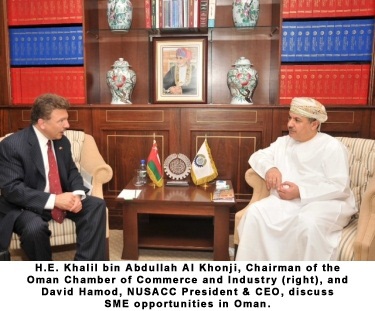
H.E. Khalil bin Abdullah Al Khonji, Chairman of the Oman Chamber of Commerce and Industry, is an advocate for job creation through entrepreneurship. He says, "Small and medium-sized enterprises make up the largest portion of the Omani private sector, and SMEs play a significant role in job creation relevant to many different levels of educational and practical qualifications." In order to foster this important role, he continues, "Entrepreneurs should benefit from the relationships that connect them with other business communities, including that of the United States, with which we have developed a unique partnership that will facilitate forward progress and development."
OCCI and the National U.S.-Arab Chamber of Commerce recently announced plans to launch the Oman-U.S. Joint Business Council, a cooperative venture between the two chambers of commerce. Promoting start-ups, facilitating job creation, and matchmaking for Omani and American SMEs will be a key part of the new Joint Business Council's work program.
Omani Government Support for Start-Ups
A work program along these lines is expected to have strong support from H.E. Ali bin Masoud bin Ali Al Sunaidi, Oman's Minister of Commerce and Industry (MOCI), who has taken a keen interest in supporting start-ups. His ministry oversees the Directorate General for Small and Medium Enterprises, and the minister recently issued Circular 1/2012, which defines the size of companies in Oman according to numbers of workers and annual revenues.
The Circular defines: Micro Enterprises as establishments with fewer than five employees and annual sales of less than 25,000 Omani Riyals (about $65,000); Small Enterprises as establishments with five to nine employees and annual sales ranging from 25,000 to 250,000 Omani Riyals (about $650,000); Medium-Sized Enterprises as those with 10-99 employees and annual sales ranging from 250,000 to 1.5 million Omani Riyals (about $3.9 million).
OCCI and the National U.S.-Arab Chamber of Commerce recently announced plans to launch the Oman-U.S. Joint Business Council, a cooperative venture between the two chambers of commerce. Promoting start-ups, facilitating job creation, and matchmaking for Omani and American SMEs will be a key part of the new Joint Business Council's work program.
Omani Government Support for Start-Ups
A work program along these lines is expected to have strong support from H.E. Ali bin Masoud bin Ali Al Sunaidi, Oman's Minister of Commerce and Industry (MOCI), who has taken a keen interest in supporting start-ups. His ministry oversees the Directorate General for Small and Medium Enterprises, and the minister recently issued Circular 1/2012, which defines the size of companies in Oman according to numbers of workers and annual revenues.
The Circular defines: Micro Enterprises as establishments with fewer than five employees and annual sales of less than 25,000 Omani Riyals (about $65,000); Small Enterprises as establishments with five to nine employees and annual sales ranging from 25,000 to 250,000 Omani Riyals (about $650,000); Medium-Sized Enterprises as those with 10-99 employees and annual sales ranging from 250,000 to 1.5 million Omani Riyals (about $3.9 million).
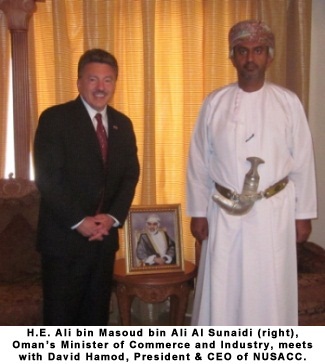
At the Oman Economic Forum in April, Minister Al Sunaidi said this about the importance of job creation: "The Government has been reacting to this challenge in many ways, including bridging the gap between the public and private sectors through raising the minimum wage in the private sector and facilitating procedures for changing positions between the two sectors." Moreover, he noted, the Omani Government has "increased job opportunities in the government sector, placed greater emphasis on education, and raised the standard of social services. We believe that the coming period should take into consideration the expansion of general economic activities -- through the encouragement of small and medium-sized enterprises -- so that they are able to play a greater role in creating job opportunities for Omanis and, consequently, in playing a more effective role in the economic cycle."
Minister Al Sunaidi's assessment hews closely to Oman's priorities as outlined in the government's "Vision 2020" strategic plan, which bolsters the Sultanate's economy by strengthening human resources, growing the private sector, and increasing diversification. Promotion of Small and Medium-sized Enterprises (SMEs) is an integral part of this initiative, which states that SMEs should be responsible for 50 percent of Oman's manufacturing by the year 2020. SMEs will also be responsible for providing increased services through partnerships with such entities as the Information Technology Authority (ITA) and Knowledge Oasis Muscat (KOM), which serves as a magnet for high tech innovation.
U.S. Government Support for Small Business
The U.S. Embassy in Muscat has actively supported efforts to increase opportunities for small companies in both Oman and United States. Last year's Oman-U.S. Economic Forum, for example, drew scores of companies and highlighted ways that American and Omani firms could partner in trade and investment ventures. More recently, the U.S. Embassy organized a roundtable discussion at the Ambassador's residence to introduce key decisionmakers in Oman's banking sector to new-to-market American companies now doing business in Oman. David Hamod, President & CEO of NUSACC, was invited to participate. Much of the discussion at the roundtable focused on financing for small and medium-sized enterprises (SMEs) through Oman's banking system, as well as non-financing measures such as business training and government procurement reform.
Minister Al Sunaidi's assessment hews closely to Oman's priorities as outlined in the government's "Vision 2020" strategic plan, which bolsters the Sultanate's economy by strengthening human resources, growing the private sector, and increasing diversification. Promotion of Small and Medium-sized Enterprises (SMEs) is an integral part of this initiative, which states that SMEs should be responsible for 50 percent of Oman's manufacturing by the year 2020. SMEs will also be responsible for providing increased services through partnerships with such entities as the Information Technology Authority (ITA) and Knowledge Oasis Muscat (KOM), which serves as a magnet for high tech innovation.
U.S. Government Support for Small Business
The U.S. Embassy in Muscat has actively supported efforts to increase opportunities for small companies in both Oman and United States. Last year's Oman-U.S. Economic Forum, for example, drew scores of companies and highlighted ways that American and Omani firms could partner in trade and investment ventures. More recently, the U.S. Embassy organized a roundtable discussion at the Ambassador's residence to introduce key decisionmakers in Oman's banking sector to new-to-market American companies now doing business in Oman. David Hamod, President & CEO of NUSACC, was invited to participate. Much of the discussion at the roundtable focused on financing for small and medium-sized enterprises (SMEs) through Oman's banking system, as well as non-financing measures such as business training and government procurement reform.
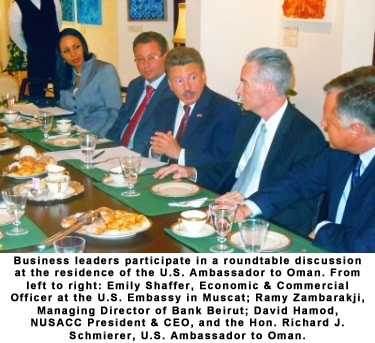
"Entrepreneurship is a cornerstone of America's economic success and represents one of the brightest hopes for expanding economic opportunity and creating jobs in emerging markets," noted Hon. Richard Schmierer, U.S. Ambassador to Oman. "As such, promoting and spurring entrepreneurship is a key plank of the U.S. Government's foreign policy agenda around the world."
"In Oman, we are working with the local and American business community," he said, "to promote small business opportunities such as franchising, reaching out to local university students to share our experience of 'Entrepreneurship in America' and partnering with the Ministry of Commerce on initiatives such as the launch of Oman's first Small and Medium Enterprise loan guarantee program."
That program, launched last fall by the Ministry of Commerce and Industry (MOCI), is intended to bridge the gap between cash-rich local financiers and the growing bulge of young Omanis seeking self-employment outside traditional public sector career paths. The program was designed by MOCI's Directorate General of SMEs (DG-SME) in partnership with the U.S. Small Business Administration (SBA) through a $2 million Middle East Partnership Initiative (MEPI) grant.
Through a Memorandum of Understanding, SBA has provided training to the ministry and to local banks that are implementing the program. The loan guarantee provides for 80 percent guarantees for SME loans of up to 250,000 Omani Riyals (about $650,000). Borrowers are expected to put 20 percent down and the Oman Development Bank (ODB) will guarantee 50 percent of the remaining loan amount and provide credit counseling, while private banks will cover the remaining 50 percent. Interest rates range from 3.4 to 4.3 percent. Borrowers are expected to be Omani citizens employed full-time in their start-up endeavor, and only one project may be funded at a time.
The new loan guarantee program will help start-ups to secure funding from banks, which are traditionally reluctant to lend to young entrepreneurs due to inherent risk and their potential lack of preparedness. The program aims to fulfill the Government of Oman's "Vision 2020" for a vibrant and diversified private sector and a generation of entrepreneurial Omanis who can serve as job creators.
The Important Role Played by SMEs in Promoting U.S. Exports
When it comes to enhancing the nation's export potential, Oman may be taking a page from America's playbook. According to the Office of the U.S. Trade Representative (USTR), "Small businesses are the backbone of the U.S. economy and the primary source of jobs for Americans. Small and medium-sized enterprises (SMEs) also account for the largest group of U.S. exporters and are a major user of imported goods."
Ambassador Ron Kirk, the U.S. Trade Representative, points out that SMEs "represent over 99 percent of employer firms in the United States and account for just over half of all private sector employment. Even more important to a country seeking rapid job gains in a post-recession economy, SMEs have generated almost two-thirds of net new jobs in the last 15 years." He notes that America's SMEs "support four million jobs by directly and indirectly exporting goods and services. Small and medium-sized businesses account for approximately 40 percent of all export-supported jobs in the United States."
Ambassador Kirk concludes, "As U.S. trade policies strive to open markets, enforce trade agreements, and support the healthy expansion of trade, it is critical that SMEs benefit as much as possible from exporting goods and services to foreign markets and contribute as much as they can to overall U.S. export growth."
The findings of the U.S. International Trade Commission (USITC) were equally compelling: "The Commission found that U.S. exporting SMEs outperform their nonexporting SME counterparts by several measures. Whether they deal in services or manufacturing, exporting SMEs show higher total revenues, faster total revenue growth, and higher labor productivity than their nonexporting SME counterparts."
According to USITC data, exporting SME manufacturers in 2009 had more than twice the total revenue of their nonexporting counterparts. These exporters had revenue growth of 37 percent between 2005 and 2009, while total revenue declined by 7 percent for nonexporting SME manufacturers over the same period. Also, labor productivity, as measured by revenue per employee, was over 70 percent greater for manufacturing SME exporters than for nonexporters.
In the same vein, data from the U.S. Census Bureau show that services SME exporters had nearly four times as much total revenue per firm as services SME nonexporters and that total revenue per firm earned by these exporters grew faster than the total revenue per firm earned by nonexporters between 2002 and 2007. Labor productivity in 2007 was more than twice as high for services SME exporters as it was for their nonexporting counterparts.
Oman may also be aware that barriers to trade, which will be eliminated over time under the Free Trade Agreement with the United States, have a disproportionately large impact on SMEs relative to large firms. The USITC estimates that SMEs contribute a substantially higher share of the value-added content embedded in exports than what is suggested by traditional trade statistics.
Getting the Message Out in the United States
Under the leadership of H.E. Hunaina Al-Mughairy, Oman's Ambassador to the United States, the Embassy of Oman in Washington has played a key role in promoting commercial cooperation between Omani and U.S. companies. This is familiar terrain for the Ambassador, who served in the Ministry of Commerce and Industry, as well as in the Omani Center for Investment Promotion and Export Development (OCIPED), during her professional career.
"In Oman, we are working with the local and American business community," he said, "to promote small business opportunities such as franchising, reaching out to local university students to share our experience of 'Entrepreneurship in America' and partnering with the Ministry of Commerce on initiatives such as the launch of Oman's first Small and Medium Enterprise loan guarantee program."
That program, launched last fall by the Ministry of Commerce and Industry (MOCI), is intended to bridge the gap between cash-rich local financiers and the growing bulge of young Omanis seeking self-employment outside traditional public sector career paths. The program was designed by MOCI's Directorate General of SMEs (DG-SME) in partnership with the U.S. Small Business Administration (SBA) through a $2 million Middle East Partnership Initiative (MEPI) grant.
Through a Memorandum of Understanding, SBA has provided training to the ministry and to local banks that are implementing the program. The loan guarantee provides for 80 percent guarantees for SME loans of up to 250,000 Omani Riyals (about $650,000). Borrowers are expected to put 20 percent down and the Oman Development Bank (ODB) will guarantee 50 percent of the remaining loan amount and provide credit counseling, while private banks will cover the remaining 50 percent. Interest rates range from 3.4 to 4.3 percent. Borrowers are expected to be Omani citizens employed full-time in their start-up endeavor, and only one project may be funded at a time.
The new loan guarantee program will help start-ups to secure funding from banks, which are traditionally reluctant to lend to young entrepreneurs due to inherent risk and their potential lack of preparedness. The program aims to fulfill the Government of Oman's "Vision 2020" for a vibrant and diversified private sector and a generation of entrepreneurial Omanis who can serve as job creators.
The Important Role Played by SMEs in Promoting U.S. Exports
When it comes to enhancing the nation's export potential, Oman may be taking a page from America's playbook. According to the Office of the U.S. Trade Representative (USTR), "Small businesses are the backbone of the U.S. economy and the primary source of jobs for Americans. Small and medium-sized enterprises (SMEs) also account for the largest group of U.S. exporters and are a major user of imported goods."
Ambassador Ron Kirk, the U.S. Trade Representative, points out that SMEs "represent over 99 percent of employer firms in the United States and account for just over half of all private sector employment. Even more important to a country seeking rapid job gains in a post-recession economy, SMEs have generated almost two-thirds of net new jobs in the last 15 years." He notes that America's SMEs "support four million jobs by directly and indirectly exporting goods and services. Small and medium-sized businesses account for approximately 40 percent of all export-supported jobs in the United States."
Ambassador Kirk concludes, "As U.S. trade policies strive to open markets, enforce trade agreements, and support the healthy expansion of trade, it is critical that SMEs benefit as much as possible from exporting goods and services to foreign markets and contribute as much as they can to overall U.S. export growth."
The findings of the U.S. International Trade Commission (USITC) were equally compelling: "The Commission found that U.S. exporting SMEs outperform their nonexporting SME counterparts by several measures. Whether they deal in services or manufacturing, exporting SMEs show higher total revenues, faster total revenue growth, and higher labor productivity than their nonexporting SME counterparts."
According to USITC data, exporting SME manufacturers in 2009 had more than twice the total revenue of their nonexporting counterparts. These exporters had revenue growth of 37 percent between 2005 and 2009, while total revenue declined by 7 percent for nonexporting SME manufacturers over the same period. Also, labor productivity, as measured by revenue per employee, was over 70 percent greater for manufacturing SME exporters than for nonexporters.
In the same vein, data from the U.S. Census Bureau show that services SME exporters had nearly four times as much total revenue per firm as services SME nonexporters and that total revenue per firm earned by these exporters grew faster than the total revenue per firm earned by nonexporters between 2002 and 2007. Labor productivity in 2007 was more than twice as high for services SME exporters as it was for their nonexporting counterparts.
Oman may also be aware that barriers to trade, which will be eliminated over time under the Free Trade Agreement with the United States, have a disproportionately large impact on SMEs relative to large firms. The USITC estimates that SMEs contribute a substantially higher share of the value-added content embedded in exports than what is suggested by traditional trade statistics.
Getting the Message Out in the United States
Under the leadership of H.E. Hunaina Al-Mughairy, Oman's Ambassador to the United States, the Embassy of Oman in Washington has played a key role in promoting commercial cooperation between Omani and U.S. companies. This is familiar terrain for the Ambassador, who served in the Ministry of Commerce and Industry, as well as in the Omani Center for Investment Promotion and Export Development (OCIPED), during her professional career.
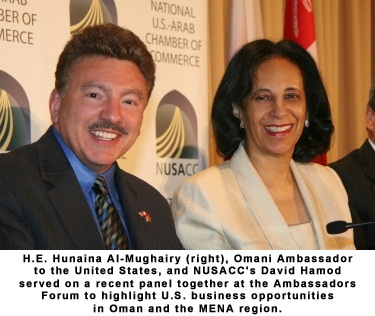
Ambassador Al-Mughairy spoke recently at an Ambassadors Forum, organized by NUSACC, in Virginia. At that event, she pointed out that Oman's Foreign Capital Investment Law has been liberalized, permitting 70 percent foreign participation in companies in most sectors and 100 percent foreign capital investment for projects of national importance. Oman's Law on Income Tax has been amended in recent years, she said, ensuring non-discriminatory treatment between Omani-owned companies and foreign companies incorporated in Oman. In the Ministry of Commerce & Industry, she suggested, a "One-Stop-Shop" now exists to assist companies to cut through bureaucratic red tape.
"In the bilateral relationship between Oman and the United States, there is an increasingly important role to be played by start-up companies, which help to create new jobs and promote economic growth," Ambassador Al-Mughairy noted recently. "The Free Trade Agreement (FTA) between our two nations supports trade and investment among small and medium-sized enterprises, which are well positioned to benefit directly from this FTA."
Barriers to trade are disproportionately tough on SMEs, according to the Office of the U.S. Trade Representative, so removing those barriers is bound to have a major impact on the competitiveness of SMEs. This is borne out in the data generated by the Oman-U.S. FTA so far. According to a forthcoming report produced by the National U.S.-Arab Chamber of Commerce:
- The Oman-U.S. FTA has a short track record, but that record is impressive. In the two years preceding implementation of the accord, bilateral trade grew an average of only 14 percent per year. After implementation, growth has averaged 43 percent per year, with no signs of slowing down.
- Over the past five years, Oman's share of the total U.S. goods import market, though small, has grown an average of 29 percent per year.
- The FTA provides essential guarantees to U.S. foreign direct investors, who support Oman's efforts to climb the value chain from fossil fuel extraction to petrochemical production.
- Total Foreign Direct Investment (FDI) in Oman ballooned from $2.6 billion in the year 2000 to $15 billion in 2011.
The Embassy of Oman in Washington DC played an instrumental role in the success of NUSACC's first-ever "Western Road Show" earlier this year. Shireen Said, Commercial Attache at the Embassy of Oman, traveled to Salt Lake City (Utah) and Los Angeles (California), where she and her colleagues met with over 200 American companies, leaders in education, and local government officials -- including Utah's Lieutenant Governor, Hon. Greg Bell, and Los Angeles Deputy Mayor for Economic and Business Policy, Hon. Matthew Karatz.
NUSACC's "Embracing U.S.-MENA Global Trade Alliances" road show began in Salt Lake City at a conference hosted in partnership with the Utah Governor's Office of Economic Development, the Utah World Trade Center, the Salt Lake Chamber, and the U.S. Commercial Service. It concluded in Los Angeles where the delegation participated in the launch of World Trade Week in cooperation with the Los Angeles Area Chamber of Commerce, the Mayor's Office, the Port of Los Angeles, and the U.S. Commercial Service.
Ms. Said, Oman's Commercial Attache, said, "The Road Show was a great success, generating strong interest in expanding commercial relations between Oman and the United States. NUSACC provided opportunities to network and explore mutual business interests and partnership with firms in Los Angeles and Salt Lake City, taking advantage of the benefits of the Oman FTA, particularly in the areas of information technology, textiles, renewable energy, and education."
"In the bilateral relationship between Oman and the United States, there is an increasingly important role to be played by start-up companies, which help to create new jobs and promote economic growth," Ambassador Al-Mughairy noted recently. "The Free Trade Agreement (FTA) between our two nations supports trade and investment among small and medium-sized enterprises, which are well positioned to benefit directly from this FTA."
Barriers to trade are disproportionately tough on SMEs, according to the Office of the U.S. Trade Representative, so removing those barriers is bound to have a major impact on the competitiveness of SMEs. This is borne out in the data generated by the Oman-U.S. FTA so far. According to a forthcoming report produced by the National U.S.-Arab Chamber of Commerce:
- The Oman-U.S. FTA has a short track record, but that record is impressive. In the two years preceding implementation of the accord, bilateral trade grew an average of only 14 percent per year. After implementation, growth has averaged 43 percent per year, with no signs of slowing down.
- Over the past five years, Oman's share of the total U.S. goods import market, though small, has grown an average of 29 percent per year.
- The FTA provides essential guarantees to U.S. foreign direct investors, who support Oman's efforts to climb the value chain from fossil fuel extraction to petrochemical production.
- Total Foreign Direct Investment (FDI) in Oman ballooned from $2.6 billion in the year 2000 to $15 billion in 2011.
The Embassy of Oman in Washington DC played an instrumental role in the success of NUSACC's first-ever "Western Road Show" earlier this year. Shireen Said, Commercial Attache at the Embassy of Oman, traveled to Salt Lake City (Utah) and Los Angeles (California), where she and her colleagues met with over 200 American companies, leaders in education, and local government officials -- including Utah's Lieutenant Governor, Hon. Greg Bell, and Los Angeles Deputy Mayor for Economic and Business Policy, Hon. Matthew Karatz.
NUSACC's "Embracing U.S.-MENA Global Trade Alliances" road show began in Salt Lake City at a conference hosted in partnership with the Utah Governor's Office of Economic Development, the Utah World Trade Center, the Salt Lake Chamber, and the U.S. Commercial Service. It concluded in Los Angeles where the delegation participated in the launch of World Trade Week in cooperation with the Los Angeles Area Chamber of Commerce, the Mayor's Office, the Port of Los Angeles, and the U.S. Commercial Service.
Ms. Said, Oman's Commercial Attache, said, "The Road Show was a great success, generating strong interest in expanding commercial relations between Oman and the United States. NUSACC provided opportunities to network and explore mutual business interests and partnership with firms in Los Angeles and Salt Lake City, taking advantage of the benefits of the Oman FTA, particularly in the areas of information technology, textiles, renewable energy, and education."
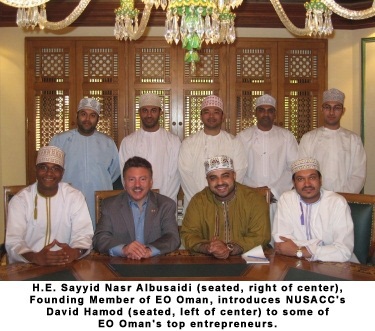
Omani Entrepreneurship: The Next Generation
Efforts to promote small business development in Oman are now spawning non-governmental entities that serve as "generational bridges" between the Sultanate's traditional private sector families and the next generation of business leaders. One of these entities is Entrepreneurs' Organization (EO) Oman, formed in 2009, which now has 26 members from leading businesses and spanning more than 30 different industries.
According to H.E. Sayyid Nasr Albusaidi, a Founding Member of EO Oman, "Many of our leading business houses in Oman were entrepreneurial startups, and they remain strong today with third and fourth generation ownerships. Some of these firms, which mainly fall under the 'family business' category, played a very important role in shaping Oman's economy, and young entrepreneurs should be encouraged to learn from some of Oman's inspiring business leaders and their experiences." He concludes, "EO Oman's members spend a lot of time mentoring younger entrepreneurs, and I have personally seen some interesting cases -- especially when it comes to helping new start-ups get off the ground."
One of the strengths of EO Oman is its ability to tap into the worldwide presence of the Entrepreneurs' Organization, a global network of almost 7,500 business owners in over 40 countries. Founded in 1987 by a group of young entrepreneurs, EO is a catalyst that enables entrepreneurs to learn from each other, leading to greater business success. Membership in one of EO's 140 chapters is by invitation only; the average member is 38 years old, with annual revenues of $14.4 million.
Efforts to promote small business development in Oman are now spawning non-governmental entities that serve as "generational bridges" between the Sultanate's traditional private sector families and the next generation of business leaders. One of these entities is Entrepreneurs' Organization (EO) Oman, formed in 2009, which now has 26 members from leading businesses and spanning more than 30 different industries.
According to H.E. Sayyid Nasr Albusaidi, a Founding Member of EO Oman, "Many of our leading business houses in Oman were entrepreneurial startups, and they remain strong today with third and fourth generation ownerships. Some of these firms, which mainly fall under the 'family business' category, played a very important role in shaping Oman's economy, and young entrepreneurs should be encouraged to learn from some of Oman's inspiring business leaders and their experiences." He concludes, "EO Oman's members spend a lot of time mentoring younger entrepreneurs, and I have personally seen some interesting cases -- especially when it comes to helping new start-ups get off the ground."
One of the strengths of EO Oman is its ability to tap into the worldwide presence of the Entrepreneurs' Organization, a global network of almost 7,500 business owners in over 40 countries. Founded in 1987 by a group of young entrepreneurs, EO is a catalyst that enables entrepreneurs to learn from each other, leading to greater business success. Membership in one of EO's 140 chapters is by invitation only; the average member is 38 years old, with annual revenues of $14.4 million.





